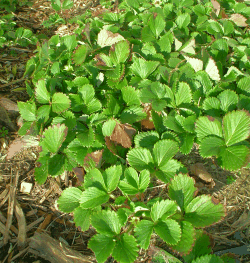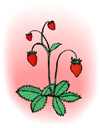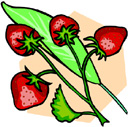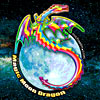
Strawberries are the fruit of any of various low-growing stemless plants with many runners belonging to the genus Fragaria, a member of the rose family, with white flowers and an edible aggregate fruit that consists of an enlarged red fleshy receptacle bearing numerous achenes (seedlike fruitlets) scattered on its exterior surface.
- botanical information
- part used
- nutritional information
- selection
- storage
- magick correspondences and uses
- Chinese herbology
- cautions and contraindications
botanical information:
Botanical name: Fragaria spp. (more than 30 species), especially Fragaria vesca
Common name: strawberry
Old English name: stréawberige (stréaw meaning straw and berige or berie meaning berry) and eorberge (meaning earth berry)
The name strawberry may have come from packing the berries in straw for market.
German name: erdbeere
Use the botanical name when ordering seeds (bulbs, etc.) or when looking up information in the library. Common names vary by nation, culture, and region, and sometimes the same common name is applied to different plants.
part used:
Part Used (food): Berries.
|
Part Used (herb): Dried leaves and leaf fragments, with some stem, mixtures frequently contain flower particles. Information courtesy of Mountain Rose Herbs |

The Strawberry Patch courtesy of Green Earth Ministries (a Christian cannabis religion) |
nutritional information:
Strawberries are a food that increases sexual energy and enhances fertility.
Eating a half-pound of strawberries or spinach has as much antioxidant effect as high doses of vitamin C, helping the body defuse oxygen radicals that can damage cells, as reported by Ronald L. Prior and Guochua Cao of the USDA Human Nutrition Research Center on Aging at Tufts University in Boston, Mass. Women were fed juice made from strawberry and spinach extracts from 8 to 10 ounces of fresh produce. Drinking red wine increased the antioxidants circulating the blood by 15%. Drinking the strawberry or spinach juice or 1,250 milligrams of Vitamin C resulted in a 20% increase.
See also Chinese herbalism below for Chinese gender and Chinese flavor.
selection:
Reason to choose organic:
Strawberries have the number six (6) highest pesticide load of 45 common fruits and vegetables studied in 2006 by the Environmental Working Group and is therefore a prime candidate for switching to organic. The EWA explains, “While washing and rinsing fresh produce may reduce levels of some pesticides, it does not eliminate them. Peeling also reduces exposures, but valuable nutrients often go down the drain with the peel. The best option is to eat a varied diet, wash all produce, and choose organic when possible to reduce exposure to potentially harmful chemicals.”
According to USDA and FDA tests on commercially grown foods collected between 2000 and 2005, strawberry has a 92.3% (percentage) of samples tested with detectable pesticides, a 69.2% (percentage) of samples with two or more pesticides, a 2.3 average number of pesticides found in a sample, an average of 0.799 parts per million of all pesticides found, and 38 different pesticides found in use growing strawberries. These toxic pesticides don’t apply to organic foods.
storage:
Storage: Eat strawberries within two days of purchase.



magickal correspondences and uses:
Love spells: Strawberry flowers are appropriate for use in love spells, such as the Aphrodite New Moon love spell.
Magick food for love spells: Strawberries are an appropriate food for love spells, such as the Aphrodite New Moon love spell, Hecate black candle love spell, or Isis Full Moon love spell. See the article on foods for more information on using food magick in spells.
Chinese herbalism:
Chinese gender: yin (cool)
Chinese flavor: slightly sweet
cautions and contraindications:
Non-toxic to animals: The American Society for the Prevention of Cruelty to Animals (ASPCA) Animal Poison Control Center has determined that strawberry and wild strawberry “have not been reported as having systemic effects on animals or as having intense effects on the gastrointestinal tract.” —ASPCA













